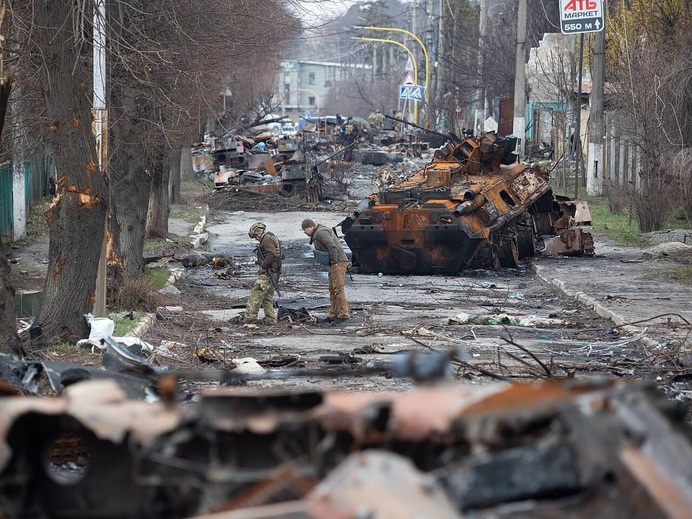
Four Points on Why Russia Invaded Ukraine
Just when everything seemed to be getting back to the new normal, abnormality struck again. The war in Ukraine is raging and changing the face of the globalized world.
The situation is confusing as people struggle to find reasons behind the invasion. Conspiracy theories abound on both sides, like the scenes of battle in Ukraine, chaos reigns in the minds of so many. There seems to be no rhyme or reason in the attacks.
However, four points can help people better understand what is happening. There is some method to the madness.
Russia Was Already Part of the World Order
The first point is that the sanctions prove that Russia was well integrated into the globalized world. Vast sectors of the Russian economy were interwoven into the worldwide networks and commodity markets. It was not easy to disengage.
This conclusion runs contrary to those who say that Russia is a power opposing the current world order. This is not true.
Western money and investment helped rebuild the country in the decades after the Cold War. Most major oil companies, for example, were involved in extracting oil from Russia. Multinational firms were everywhere. Western banks and accounting firms helped integrate Russia into the financial system. Even the McDonald’s franchise operated at hundreds of Russian locations. The sanctions proved the extent of Russian participation in the world economy.
Unfortunately, Russia fully absorbed decadent globalized culture in movies, concerts and bad fashions. All these things harmed the nation (and the West). The sanctions in this area also proved that, before the war, Russia was a fully integrated part of the World Order.
Russia Pursues an Instant Disengagement from this World Order
The second point is that Russia is pursuing a rapid disengagement from its important yet second-tier place in the current world order. President Putin used the one thing that could cause Western disinvestment quickly: an unjust war that would galvanize worldwide public opinion by its brutality.
He knew that the West is terrified by the prospect of war and will use every economic sanction in the book to avoid conflict. Thus, as the war gets ever more intense, the economic sanctions levied against Russia become greater. The Russian President facilitated instant disengagement and let the West do it.
In just weeks, he has managed to destroy the work of decades. The disengagement has the advantage that the Western firms are leaving Russia of their own accord with the approval and pressure of governments. They leave behind assets sold at fire-sale prices or abandoned. Everything will be in Russian hands or face nationalization.
A Desired and Forced Geopolitical Realignment
Thirdly, Russia made no secret of its alignment with China in the period leading up to the war. At the Winter Olympics, President Putin and Chinese leader Xi Jinping signed a joint statement signaling their desire to construct a new “multipolar” world order. They agreed to cooperate “without limits” to achieve this goal of ushering in “international relations of a new type.” The Russian President has long idealized a Eurasian union that would form a single trading and cultural bloc independent of the West.
The war in Ukraine is putting this non-secret plan into effect. It forces Russia to unite with China, which is the only power big enough to resist the pressure of Western sanctions against Russia. The burning of the economic bridges with the West makes China the only nation that can absorb the massive amounts of raw materials and grains that Russia produces. The two countries combined can scramble the post-Cold war economic and political order and create new tensions and shortages. Some speculate that the forced marriage between China and Russia will lead to a parallel financial system with the yuan as the reserve currency.
The desired realignment will pit the decadent West against the post-communist East. Two distinct political blocs are forming, which will present the world with two false alternatives: crumbling liberal democracy or autocratic national socialism.
The Target Is the Vulnerable West
Finally, this move comes at a time of extreme vulnerability in the West. The two-year pandemic already unraveled many complex relationships and supply chain links that held the world together. Brutal restrictions and mandates have polarized populations and hinder governments’ abilities to unite efforts and confront problems. Irresponsible government decisions and labor and supply problems are fueling high levels of inflation.
The war will wreak havoc upon the West by scrambling further the already stressed production systems. The millions of refugees flooding into Europe add to the burdens already carried by the host countries, taking up resources that could be used to strengthen defense abilities in the West.
In this scenario, the East holds advantages. East and West are so integrated that it will not be easy for the West to wean itself from Eastern (especially Chinese) products quickly. The natural gas pipelines are like nooses around the necks of Western countries over-dependent on Russian fuel. Chinese goods so dominate the market that there are few alternatives. The Ukraine war and the economic sanctions also put the West in a precarious position.
The East’s autocratic (read totalitarian) regimes suffer much less from these problems than the fragmented Western societies. The East has much to gain and the West much to lose by this splitting up.
There is a method to this madness. One final result of the Ukraine war will be this permanent division between East and West. It will signal the failure of the post-Cold War experiment that was supposed to signal the end of history. A major geopolitical realignment will take place that could have dramatic consequences and lead to world war.
Photo: Oleksandr Ratushniak
